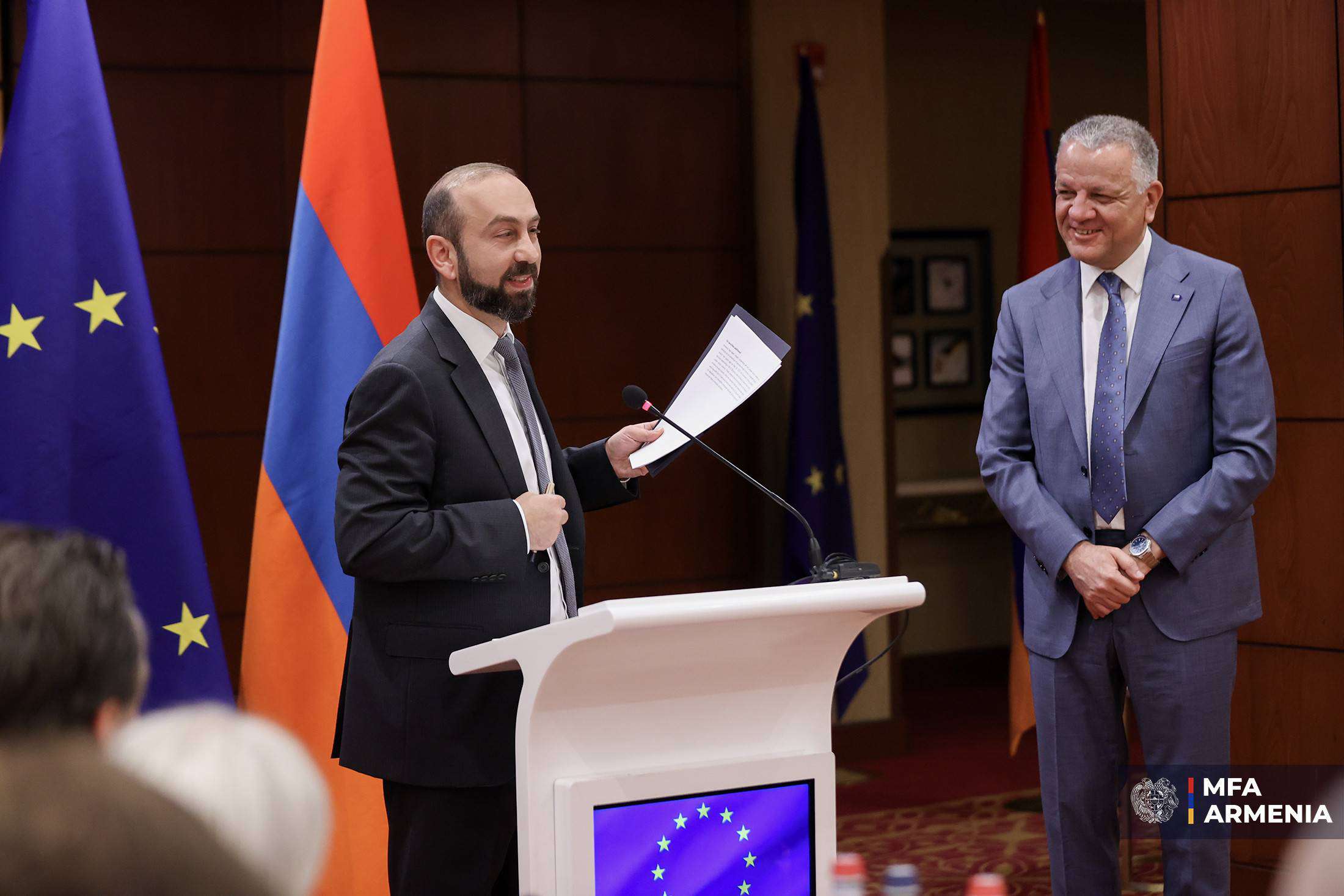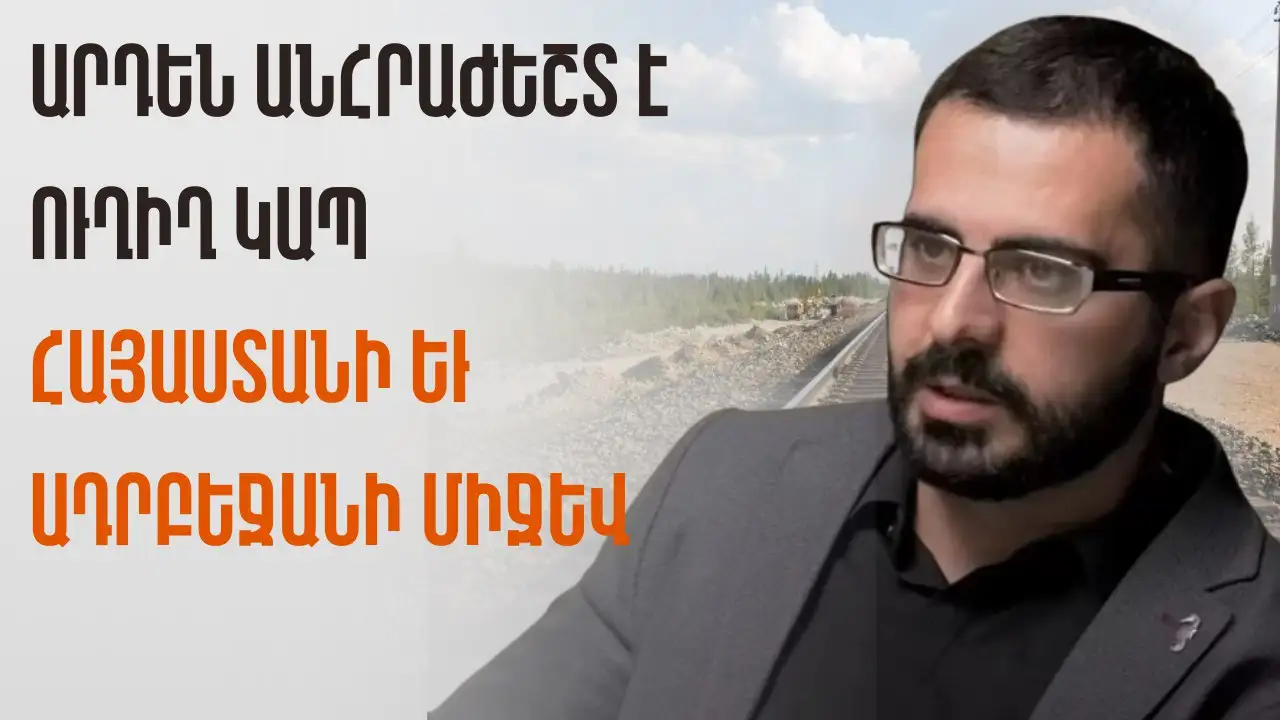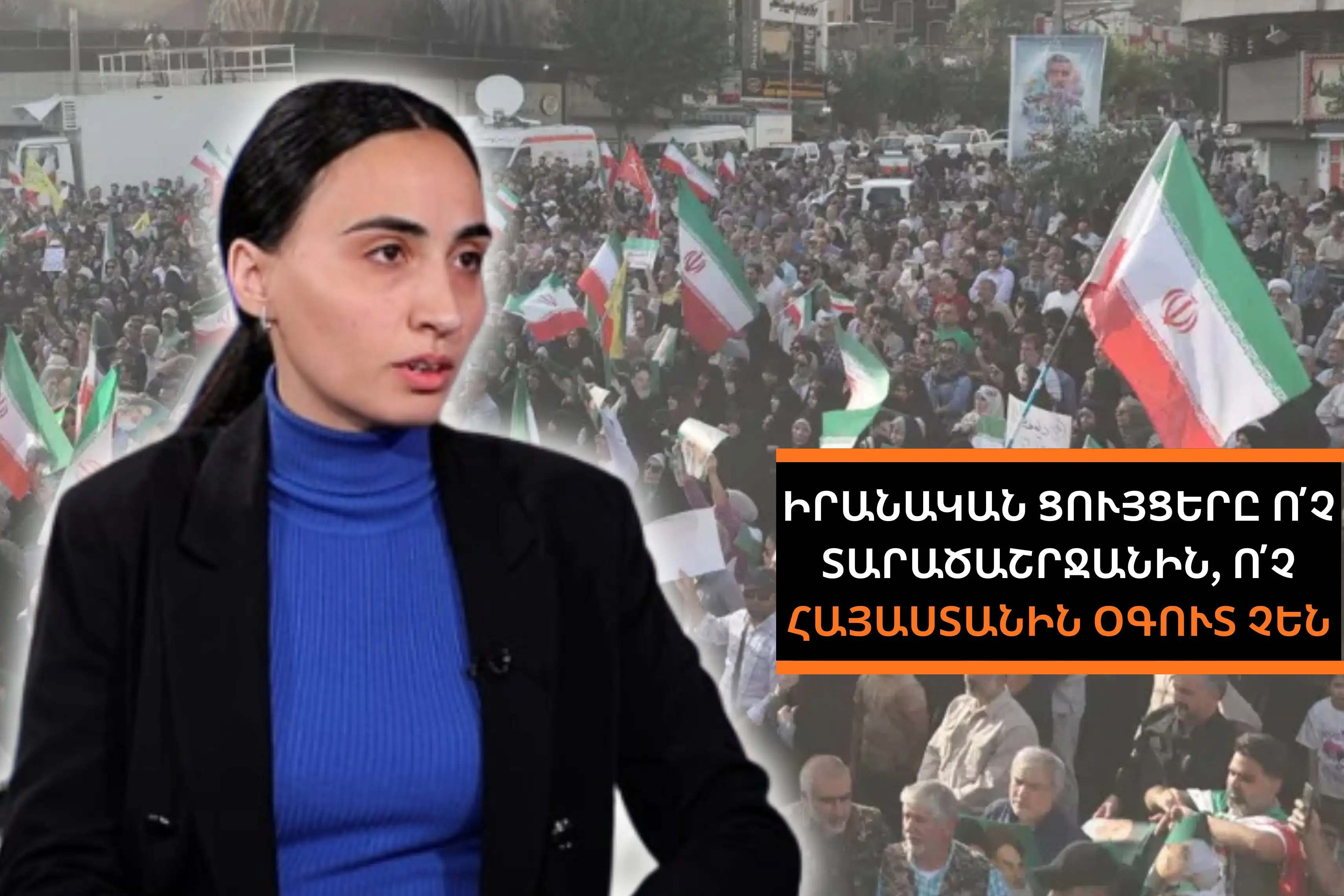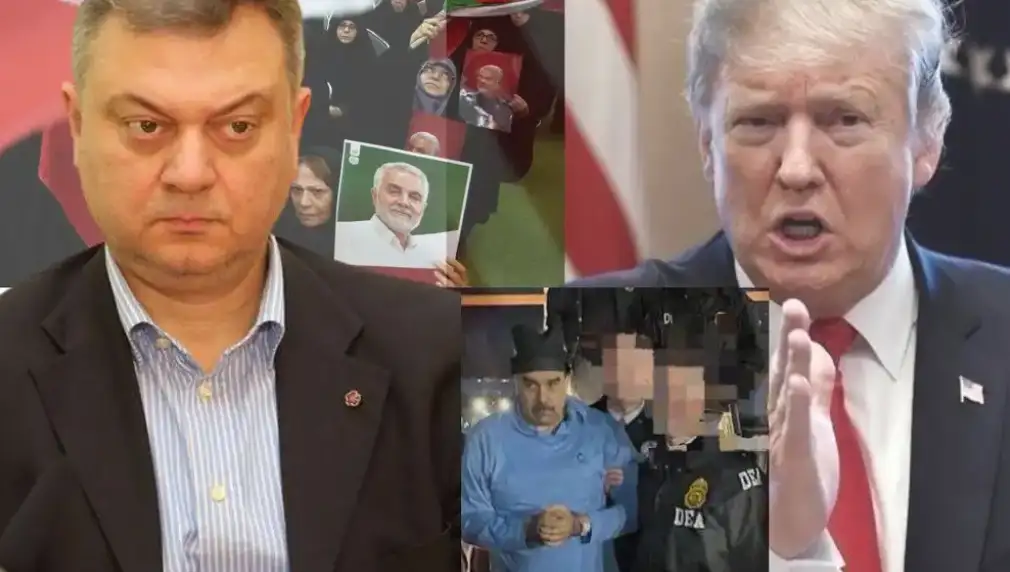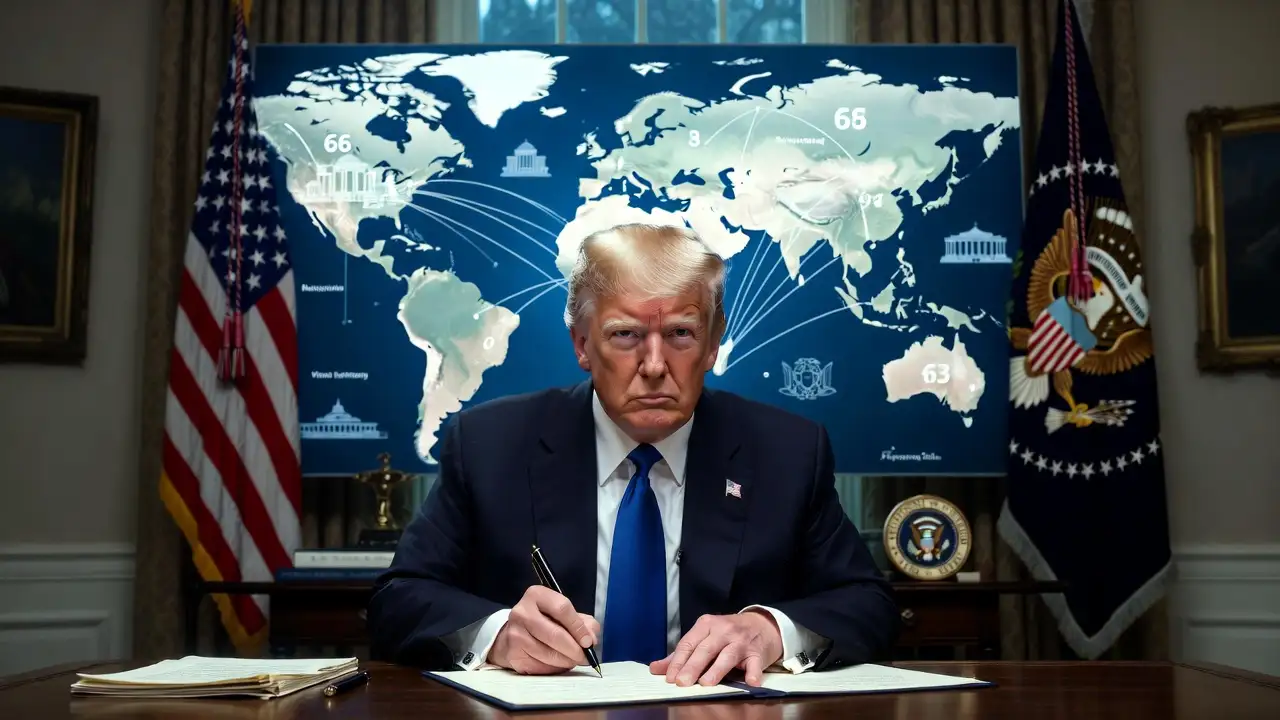On May 20, RA Foreign Minister Ararat Mirzoyan delivered a speech at the Regional Meeting of the European Union Ambassadors opening to Eastern Europe and Central Asia.
The RA Foreign Minister also answered questions from EU officials.
Minister Mirzoyan's speech is presented below.
"Armenia in the EU: Building a Common Future"
I am pleased to welcome you all to Yerevan. The holding of this seminar in Armenia is a testament to the ongoing deepening of the Armenia-EU partnership. Your discussions here will be insightful and conducive to guiding our joint path, along which our commitment to follow continuously increases.
This discussion takes place at a time characterized by interesting developments, changes, and numerous uncertainties. This is not only in terms of the dynamic growth of the Armenia-EU bilateral partnership but also considering global and regional trends and security dilemmas within the EU.
Here, I have a straightforward question, the answer to which is also simple, but the consequences it causes directly impact all of us, both in the EU and our region. Are we living in the same world that we lived in last year? I am not even talking about the situation 4-5 years ago. Of course not. Has the current security architecture and the international order effectively responded to the current and emerging challenges? I am sure not. Are there quick and easy solutions to fill the gaps and overcome the upheavals? I think there are no simple solutions, but through a reassessment and a deeper understanding of contemporary challenges, and therefore a reassessment of priorities, it is necessary to ensure a more potent synergy between core values, democratic principles, and, at the same time, bold solutions.
We are following the security dilemmas and discussions in the EU; we are closely following the choices that the EU is facing.
Democracy
Four years ago, amid a hybrid war, Armenia held free and democratic elections. I am not even sure that at that time, we all fully imagined what form hybrid war could take on the ground and how widespread irregular interference in democratic processes could be. Now, when we follow the electoral processes in Europe, we notice that hybrid wars have become more visible.
Accordingly, to protect democracy in Armenia, we have relied on democracy itself and the mechanisms it provides, first of all, free elections and the rule of law. Since then, we have not deviated from this path. Even amidst existential challenges, Armenia has consistently maintained its democratic path. This path has been reflected in the government's policy, serving as the basis for implementing large-scale reforms to ensure the independence of the judiciary, combating corruption, and strengthening the protection of human rights. And we already have concrete results. One of the most recent examples is that Armenia has made significant progress in the Reporters Without Borders ranking, improving its index by nine positions. It is now in 34th place, even ahead of several EU member states.
In addition, democracy has become a form of state governance and one of the pillars of strengthening the country's independence and sovereignty.
Diversification
We have also taken bold steps to diversify our partnerships.
Armenia is actively strengthening its strategic relations with the United States in this context. In January, we signed a comprehensive Strategic Partnership Charter with the United States, which marked a historic milestone in our cooperation. As evidenced by the continuous constructive contacts of high-level officials, we aim to develop these relations under the new US administration.
Significantly, we are also actively expanding our strategic partnership with EU Member States. I am proud to note the results achieved with the Netherlands, with the signing of a Strategic Partnership Declaration between the two countries.
We have established a Strategic Dialogue with the United Kingdom, which signifies the strong cooperation and friendship between our two democracies.
As recent high-level visits have shown, we see enormous potential for deepening Armenia-Nordic-Baltic (NB8) cooperation, which is a prime example of established democracies and regional cooperation.
While we have already built a strong partnership through our bilateral cooperation through the institutional architecture of the cornerstone document, the Comprehensive and Enhanced Partnership Agreement (CEPA), we are now finalizing the new Armenia-EU Partnership Agenda. This forward-looking document will take our cooperation to a new level through strategic priorities and action plans. It builds on our strong partnership in recent years, covering various areas, from justice reforms to economic development, transport, and energy.
In 2024, we reached another important milestone: Armenia became the only non-EU candidate country to receive support under the Resilience and Growth Programme. As we continue to discuss ways to increase the effectiveness of reforms under this program, we rely on the EU's guidance and support to fully realize its potential.
Last year, we reached the launch of the Visa Liberalization Dialogue (VLD) and are now working on a Visa Liberalization Action Plan, which will set clear benchmarks. Once these are met, our citizens can enjoy visa-free travel – a long-awaited development that will boost mobility and mutual understanding. I want to be very frank here: this is undoubtedly one of the areas through which our citizens can get closer to the EU and experience the benefits of being part of the European family and vice versa.
At a high-level meeting in Tirana last week, European Council President António Costa and Commission President Ursula von der Leyen invited Prime Minister Pashinyan to visit Brussels to discuss how we can further enrich the agenda. Creative solutions are needed, going beyond traditional approaches. These could include, for example, the possibility of using Autonomous Trade Measures, providing Armenia with tools to combat foreign information manipulation and interference, strengthening our common resilience against hybrid threats, and other practical steps.
This is entirely consistent with the statement made by the Prime Minister of Armenia in the European Parliament in October 2023: "The Republic of Armenia is ready to be as close to the European Union as the European Union deems possible." This approach is entirely consistent with the aspirations of the citizens of Armenia, as reflected in the Law "On the Launch of the Process of the Republic of Armenia's Accession to the European Union" adopted by the National Assembly of Armenia just two months ago. This is not just a policy choice but a national aspiration, a testament to the confidence of the citizens of Armenia in their European future, and a guiding principle for our government.
Turning to the other pillars of Armenia-EU cooperation, we recognize the importance of engagement in security-related issues, which would have been considered unthinkable a few years ago. The European Union has been engaged in Armenia's security agenda since the deployment of the EU Monitoring Mission, and we welcome the extension of the mission's mandate. Despite tangible results recorded in the border demarcation process with Azerbaijan last year, ceasefire violations continue, which once again underlines the mission's vital role in refuting false accusations and maintaining predictability and stability. Therefore, a targeted and principled response to ceasefire violations is paramount in the fragile situation.
While the EU's decision to support Armenia through the European Peace Facility last year was a significant achievement, we have already requested to continue support through the Facility in 2025. This assistance demonstrates the EU's political will to broaden and deepen our partnership and strengthen Armenia's resilience in difficult times. Continuing our work with all Member States, we expect our partners to ensure this support, making it predictable and free from unconnected considerations.
Continuing the theme of security diversification, I would like to draw your attention to the fact that Armenia has reduced its dependence on defense imports from a single source by up to 95%. In parallel, our government has been able to exercise more autonomy in border control and consider alternative ways to ensure energy independence, including in the nuclear and renewable energy sectors.
The Government of Armenia has decided to engage more closely in international legal mechanisms to ensure a more secure and predictable environment for the country. As you know, Armenia has ratified the Rome Statute of the International Criminal Court.
Peace, Neighborhood
As we continue to make efforts to build and strengthen like-minded partnerships across a broad geography, our priority remains to create and promote a peaceful and prosperous environment around Armenia in our immediate neighborhood.
Peace is our country's only option. Our government is firmly committed to promoting sustainable peace and prosperity in the South Caucasus.
We consistently strive to establish a comprehensive and institutionalized peace with Azerbaijan. As you know, Armenia and Azerbaijan have announced that the draft text of the Peace Treaty has been agreed upon, and Armenia is ready to sign and ratify this document immediately. While it is not yet clear whether Azerbaijan has genuine concerns or is artificially delaying the process, the fact is that the Peace Treaty agreed upon between the two countries has not yet been signed. If the concerns are genuine, for example, on a constitutional issue, then without going into details, I can assure you that the most straightforward and most direct way to address all the concerns of the parties is the signing of the agreement and its ratification by the Parliament, after a positive conclusion by the Constitutional Court of Armenia.
In any case, we call on our European partners to intensify their support for this process. Therefore, we expect our EU partners to consistently emphasize the need to immediately sign a peace agreement with Armenia, both in their direct contacts with Baku and in their public statements and communications.
In parallel with the efforts to establish peace, we are actively promoting the issue of unblocking communications in our region within the framework of the principles enshrined in the "Crossroads of Peace" initiative. This initiative proposes that all transport infrastructure and links in the South Caucasus, be they roads, railways, energy, or communication lines, operate under the sovereignty and national jurisdiction of the states through whose territory they pass and are based on the principles of reciprocity and equality.
We see the "Crossroads of Peace" as fully compatible with the EU's "Global Gateway" and "Middle Corridor" concepts, which increasingly emphasize transparent, secure, and sovereignty-respecting connectivity. Armenia's engagement in these formats is both timely and necessary. Now is the right time to anchor Armenia more profoundly and strategically in Europe's vision of evolving connectivity as a committed, predictable, democratic, and principled partner at the heart of a region undergoing profound transformation.
In this vein, we are actively exploring multimodal corridors connecting the Black Sea to the Caspian Sea, stretching eastwards to Central Asia's growing markets and energy resources. We welcome the EU's increased engagement in Central Asia and encourage synergies between the EU's South Caucasus and Central Asia strategies. As European Commission President Ursula von der Leyen rightly noted: "…the opening of Armenia's borders with Turkey and Azerbaijan will be a game-changer. And it will bring Europe and Central Asia closer together than ever before." Armenia is ready to act as a constructive bridge between these regions, promoting infrastructure links and digital, energy, and regulatory interoperability.
Our steps demonstrate Armenia's commitment to regional peace and stability to normalize relations with Turkey. High-level dialogue continues, including meetings between the Prime Minister of Armenia and the President of Turkey and my contacts with the Minister of Foreign Affairs. We are deeply convinced that a full normalization – establishing diplomatic relations and opening borders – will open up significant opportunities for both our countries and the wider region.
I spoke about normalizing relations with Azerbaijan and Turkey. Still, I would like to note that we already have well-established and intensive cooperation with our other two neighbors, Georgia and Iran.
Our cooperation with Iran provides additional strategic depth. We can contribute to broader regional connectivity through the Persian Gulf-Black Sea corridor, connecting Central Asia and the South Caucasus with the Gulf states and beyond.
Closing message
We are facing a decisive moment. Armenia has made an irreversible choice: toward democracy, peace, and Europe. We are confident that our European partners will respond to these decisive steps with equally bold and strategic engagement, strengthening a genuinely reciprocal and transformative partnership. Thus, we seek not only support but also partnership, not only encouragement but also sustained engagement. Together, we can show that principled, like-minded partnerships still matter in an increasingly divided world.
Let us build our cooperation on shared values and take bold and creative steps for stability, resilience, and prosperity in our region and beyond. Thank you.




